By its recent acquisition of TutorVista in the largest ever one-time investment in India's education sector, the London-based Pearson Plc — the world’s largest education and publishing conglomerate (revenue: Rs.40,880 crore in 2009) — committed itself to active involvement with Indian education. Dilip Thakore reports
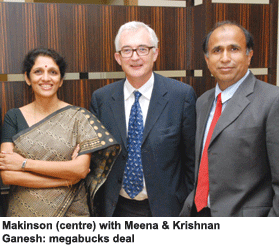 It could prove to be a defining date in the history of post- indep-endence India’s moribund K-12 education system notorious for rote memorisation traditions, massive primary school dropouts (53 percent) and poor learning outcomes. On January 18 the London-based Pearson Plc (aka Pearson Group) — arguably the world’s largest education and publishing conglomerate (aggreg- ate revenue: £5.6 billion or Rs.40,880 crore in 2009) — committed itself to the growth and development of Indian education by investing a massive $127 million (Rs.577 crore) — the largest ever one-time investment in India’s education sector — for a 76 percent equity stake in the Bangalore-based online tutoring, ICT-in-education and K-12 education company TutorVista Pvt. Ltd.
It could prove to be a defining date in the history of post- indep-endence India’s moribund K-12 education system notorious for rote memorisation traditions, massive primary school dropouts (53 percent) and poor learning outcomes. On January 18 the London-based Pearson Plc (aka Pearson Group) — arguably the world’s largest education and publishing conglomerate (aggreg- ate revenue: £5.6 billion or Rs.40,880 crore in 2009) — committed itself to the growth and development of Indian education by investing a massive $127 million (Rs.577 crore) — the largest ever one-time investment in India’s education sector — for a 76 percent equity stake in the Bangalore-based online tutoring, ICT-in-education and K-12 education company TutorVista Pvt. Ltd.
The Pearson Group’s careful stalking and acquisition of TutorVista in this megabucks deal which made 40-point headlines in the country’s financial if not mainstream press, is of momentous significance because it signals this London-based multi-business and multi-divisional education and communications behemoth’s intent to seriously deepen its engagement with Indian education. Though the Pearson Group has a two-decades-old association with Indian education, hitherto it’s been restricted to the supply of English-medium text-books to the country’s estimated 15,000 high-end CBSE, CISCE and foreign examination board-affiliated schools and a handful of quality-conscious colleges.
Now with the acquisition of the multi-business TutorVista (promoted by serial entrepreneurs Krishnan and Meena Ganesh in 2005), a pioneer in K-12 offshore online maths and science tutoring with over 20,000 enroled stud-ents in the US and Europe, and also in the entrance tests prep, ICT (information communication technologies) services for schools (through its acquisition of Edurite Pvt. Ltd in 2007) and in bricks-n-mortar schools promotion and manag-ement (through the promotion of Manipal K-12 Pvt. Ltd in 2008), Pearson India has transformed from a peripheral B2B (business-to-business) enterprise company into a full-spectrum B2B and B2C (business-to-consumer) heavy-weight corporation in India’s awakening education sector.
“The TutorVista acquisition under-lines Pearson’s commitment to education and skills development in India. It gives us control of the world’s largest online tutoring business and, crucially, a solid platform on which to build a leading presence in K-12 education in this country. We believe we can contribute by building a technology-enabled education services business in India,” says John Makinson, the London-based director of Pearson Plc and chairman of Pearson India.
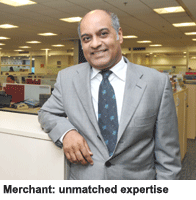 Makinson’s statement of intent is endorsed and elaborated by Khozem Merchant, the Delhi-based president of Pearson India. “Until three years ago when the directors of Pearson plc identified India as a strategic market for the company, Pearson India was a tradit-ional textbooks publishing enterprise. But since then we have expanded and deepened our involvement with Indian education by making two major investments in this country. In 2009 Pearson invested $30 million (Rs.135 crore) to co-promote IndiaCan, a vocational education and training initiative with Educomp Solutions Ltd, followed by acquisition of a 17.2 percent stake in TutorVista, upped to 76 percent recently. Our intent is to become thoroughly involved with Indian education by providing an entire range of testing and assessment services including dyslexic testing; English language learning and testing; teacher training; curriculum and content development; vocational training; online tutoring; entrance examinations test prep and school management. Following the acquisition of TutorVista, Pearson India is now committed to bringing unmatched expertise from the world’s largest education company into India’s education sector,” says Merchant, who served a long stint with the Financial Times (1988-2006) prior to being appointed the Delhi-based chief executive and president of Pearson India in 2008.
Makinson’s statement of intent is endorsed and elaborated by Khozem Merchant, the Delhi-based president of Pearson India. “Until three years ago when the directors of Pearson plc identified India as a strategic market for the company, Pearson India was a tradit-ional textbooks publishing enterprise. But since then we have expanded and deepened our involvement with Indian education by making two major investments in this country. In 2009 Pearson invested $30 million (Rs.135 crore) to co-promote IndiaCan, a vocational education and training initiative with Educomp Solutions Ltd, followed by acquisition of a 17.2 percent stake in TutorVista, upped to 76 percent recently. Our intent is to become thoroughly involved with Indian education by providing an entire range of testing and assessment services including dyslexic testing; English language learning and testing; teacher training; curriculum and content development; vocational training; online tutoring; entrance examinations test prep and school management. Following the acquisition of TutorVista, Pearson India is now committed to bringing unmatched expertise from the world’s largest education company into India’s education sector,” says Merchant, who served a long stint with the Financial Times (1988-2006) prior to being appointed the Delhi-based chief executive and president of Pearson India in 2008.
Serial entrepreneur and former Tesco India chief executive Meena Ganesh who together with her husband Krishnan Ganesh promoted TutorVista in 2005, is equally satisfied with the new partnership. “With the availability of the massive resources of the Pearson Group we will be able to scale up TutorVista’s operations and reach out to the high potential markets of South-east Asia,” says Meena Ganesh.
This decision of the Pearson Group’s London-based top manage-ment to roll out its entire arsenal of products and services in the Indian market, which hosts the world’s largest population of children and youth by scaling up its Indian subsidiary, makes eminently good business sense. It’s hardly a secret that the country’s 550 million children and youth — and society in general — are becoming increasingly aware that real, outcomes-driven education is the only passport out of the poverty and misery experienced by their parents short-changed by the ersatz and commercially useless education dispensed to them by post-independence India’s 1.25 million government primary-secondary schools and the overwhelming majority of the country’s 509 universities and 31,000 colleges.
Suddenly there’s a new and irresistible demand for high-quality globally bench-marked K-12 and higher education, not only within the country’s 40 million middle class households — but as evidenced by the swelling exodus of children from even the poorest house-holds countrywide to private urban and rural ‘budget’ schools — within the country’s other 160 million households as well. And Pearson Education — the company’s largest business division accounting for 67 percent of the Pearson Group’s global sales revenue — which has rapidly metamorphosed from an education textbooks publishing enterprise into a new technologies-driven content and curriculums, testing and assessment and certification corporation in its own right — is superbly equipped and positioned to fulfill it.
The Pearson Group of companies, businesses, publications and imprints traces its origins to 1844 when Weetman Pearson (later Lord Cowdray) promoted Pearson & Son as a small building firm in the north of England, and transformed it into one of the 19th century’s largest construction firms which built harbours in Dover, England; Vera Cruz, Mexico and Valparaiso in Chile; the docks of Milford Haven and Southampton in England; the Halifax docks in Nova Scotia, Canada; the Manhattan tunnel in the US apart from railroads in Spain, Colombia, China and Mexico. Yet during the past century it has morphed into an equally successful education products and services, newspapers and books publishing transnational.
Currently the educational books publishing companies and imprints within the Pearson Group include Longman, Prentice Hall, Putnam, Addison Wesley, Allyn & Bacon, Benjamin Cummings and Macmillan, USA apart from the well-known Penguin Books which includes Hamish Hamilton Allen Day, Puffin and Dorling Kindersley. Moreover Pearson also owns the Financial Times, London and a 50 percent shareholding in the globally reputed weekly The Economist.
Latterly the top brass of this well-managed and highly profitable (net profit £858 million or Rs.6,263 crore in 2009) education-focused conglomerate headed by its celebrity woman chief executive Dame Marjorie Scardino, has taken the inorganic route to growth and development through a flurry of acquisitions of education and publishing companies worldwide. Among them: Dorling Kindersley and National Computer Systems — the premier educational testing and data management company in the US (in 2000); an 85 percent equity stake in Kirihara, one of Japan’s leading educational publishers (2001); Rough Guides, UK — a travel and music publishing company (2002); Edexcel — Britain’s largest school-leaving examinations certification body (2003); AGS Publishing, UK — an educational and testing company for challenged children (2005); eCollege, Harcourt Education International and Harcourt Assessments (2007); controlling interests in Longman Books Nigeria (2008); and Wall Street English, an English language learning institute in China (2009); the school learning systems division of Sistema Educacional Brasileiro (SEB), one of Brazil’s leading education companies (2010) and TutorVista in India (2011).
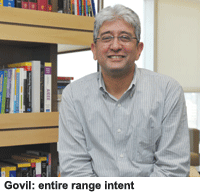 For the small minority of bona fide educationists intent upon root and branch reform of India’s bankrupt K-12 and higher education systems, Pearson Group’s wide range of tried and trusted education products and services offers exciting prospects and possibilities. Especially because the top management of Pearson Education (India) seems set to roll out the entire range of products and services offered by its parent company.
For the small minority of bona fide educationists intent upon root and branch reform of India’s bankrupt K-12 and higher education systems, Pearson Group’s wide range of tried and trusted education products and services offers exciting prospects and possibilities. Especially because the top management of Pearson Education (India) seems set to roll out the entire range of products and services offered by its parent company.
“In a low-profile style, we have been active in the academic textbooks adaptation and publishing business in India for several decades, not only in K-12, but higher education as well. For several decades Pearson Education has been printing and publishing best-selling British and American engineering, science and the humanities textbooks specially adapted by Indian co-authors, for college and university students and libraries in India at a fraction of UK and US prices. Now our intent is to provide the entire range of Pearson Education’s products and services including ICT and multimedia-enabled teaching-learning, testing and assessment, certification, school management and vocational training to the Indian market. Indian society and particularly the country’s fast-expanding middle class is becoming increasingly learning-outcomes focused and we believe that Pearson Education is well equipped to meet India’s pressing demand for world-class education content and services,” says Vivek Govil, president of Pearson Education India. An alumnus of Sydenham College, Mumbai and IIM-Calcutta, Govil served with Lintas Advertising (1986-89), Gillette India (1989-2006) and Oberoi Hotels (2006-08) before taking charge of Pearson Education (India) in 2008.
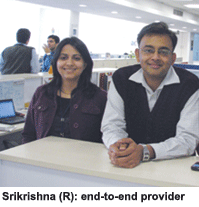 According to Anish Srikrishna, an alum of the Asian Institute of Management, Manila who earned his spurs in marketing in Hindustan Lever, Coca Cola and Samsung India prior to signing up with Pearson Education India last July, the company has already — even if unobtrusively — built a solid base in Indian academia. “Although the public may not be aware, Pearson Education has earned considerable goodwill within the academic and student communities in higher educa-tion by making vitally important British and American textbooks available in India at Indian prices. For instance marketing guru Philip Kotler and Kevin Keller’s Marketing Management which is priced at $202.67 (Rs.9,120) in the US, is priced at Rs.699 in India and Organic Chemistry by Robert T. Morrison and Robert N. Boyd — the defining textbook on the subject — priced at $ 201.60 (Rs.9,072) in the US is marketed by us in India at Rs.599. In school education as well, for the past several years we have made the world’s best textbooks available to students and teachers at affordable India prices even as we have been training 10,000 teachers per year to improve learning outcomes in their classrooms. Now we are ready to integrate our traditional textbooks publishing business in India with digital and online technologies and establish Pearson Education as an end-to-end solutions provider for Indian educ-ation,” says Srikrishna.
According to Anish Srikrishna, an alum of the Asian Institute of Management, Manila who earned his spurs in marketing in Hindustan Lever, Coca Cola and Samsung India prior to signing up with Pearson Education India last July, the company has already — even if unobtrusively — built a solid base in Indian academia. “Although the public may not be aware, Pearson Education has earned considerable goodwill within the academic and student communities in higher educa-tion by making vitally important British and American textbooks available in India at Indian prices. For instance marketing guru Philip Kotler and Kevin Keller’s Marketing Management which is priced at $202.67 (Rs.9,120) in the US, is priced at Rs.699 in India and Organic Chemistry by Robert T. Morrison and Robert N. Boyd — the defining textbook on the subject — priced at $ 201.60 (Rs.9,072) in the US is marketed by us in India at Rs.599. In school education as well, for the past several years we have made the world’s best textbooks available to students and teachers at affordable India prices even as we have been training 10,000 teachers per year to improve learning outcomes in their classrooms. Now we are ready to integrate our traditional textbooks publishing business in India with digital and online technologies and establish Pearson Education as an end-to-end solutions provider for Indian educ-ation,” says Srikrishna.
An insight into the type of sophisticated education services Pearson Education India is beginning to roll out in this country’s technologically backward education sector is offered by Pearson VUE which bills itself as the world’s largest computer-based testing enterprise. Its clients’ list includes GMAC (which conducts the GMAT test, a prerequisite of entry into all American B-schools), Cisco, Oracle, the Australian Medical Council and the DVLA (Driver and Vehicle Licensing Agency) which licences all motor vehicle drivers in the UK.
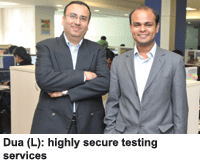 “Reliable, high-security testing services are vitally important for academic institutions, employers, governments, professional councils and industry to recruit appropriate personnel and maintain high standards and organisational reputations. Pearson VUE has developed the world’s most rigorous and robust computer-based tests which are conducted in 5,000 standardised testing centres worldwide, equipped with unique biometric identification and vigilance systems to prevent impersonation and fraud. Over the past several years Pearson VUE has built an international client list of 300 organisations with 300,000 graduates in 100 countries writing GMAT online in Pearson approved test centres. Moreover, every year 2 million driving licence applicants in the UK take our DVLA test. Now we are all set to offer our highly-secure testing services to Indian education institutions and industry in 300-plus approved test centres established across India,” says Sandeep Dua, an engineering and business management alumnus of Pune University and IGNOU who served with Methodex Systems and NIIT (1996-2008) prior to taking charge as chief executive of Pearson VUE India in 2008.
“Reliable, high-security testing services are vitally important for academic institutions, employers, governments, professional councils and industry to recruit appropriate personnel and maintain high standards and organisational reputations. Pearson VUE has developed the world’s most rigorous and robust computer-based tests which are conducted in 5,000 standardised testing centres worldwide, equipped with unique biometric identification and vigilance systems to prevent impersonation and fraud. Over the past several years Pearson VUE has built an international client list of 300 organisations with 300,000 graduates in 100 countries writing GMAT online in Pearson approved test centres. Moreover, every year 2 million driving licence applicants in the UK take our DVLA test. Now we are all set to offer our highly-secure testing services to Indian education institutions and industry in 300-plus approved test centres established across India,” says Sandeep Dua, an engineering and business management alumnus of Pune University and IGNOU who served with Methodex Systems and NIIT (1996-2008) prior to taking charge as chief executive of Pearson VUE India in 2008.
Massive investment in research and development of next generation computer-based testing systems has enabled the Pearson Group to enter the booming English language testing business with the promotion of its PTE (Pearson Test of English)-Academic, a convenient alternative to the well-established TOEFL (Test of English as a Foreign Language) and IELTS (Inter-national English Language Testing Service) tests of 50 and 20 years vintage respectively, which are written by students round the world aspiring for admission into American, British and Commonwealth universities.
“The distinguishing feature of PTE-Academic is that it is a completely computer-based English language proficiency assessment test inasmuch as students take the test on computer terminals in secure Pearson VUE test centres; test papers are marked by computers and results are delivered online. This process has a turnaround time of less than one-fifth required by the other two major English language testing services,” says John K. Philip, the Noida-based regional director (SAARC) of Pearson Language Tests, a business vertical of Pearson Education India.
.gif) According to Philip — an English literature graduate of Delhi University who worked with IDP Education Australia (1996-2000) and the British Council (2000-06) before signing up with Pearson Education in 2009 — because it employs advanced new technologies, PTE-Academic has quickly established itself as a serious rival of TOEFL and IELTS after its global launch in 2009, although he declines to disclose numbers. “Now together with Pearson VUE and carefully selected professional partners trained by us to promote PTE-Academic and provide counseling and test preparation services, we are rolling out PTE-Academic nationally as a more advanced and student-friendly test of English language proficiency,” says Philip.
According to Philip — an English literature graduate of Delhi University who worked with IDP Education Australia (1996-2000) and the British Council (2000-06) before signing up with Pearson Education in 2009 — because it employs advanced new technologies, PTE-Academic has quickly established itself as a serious rival of TOEFL and IELTS after its global launch in 2009, although he declines to disclose numbers. “Now together with Pearson VUE and carefully selected professional partners trained by us to promote PTE-Academic and provide counseling and test preparation services, we are rolling out PTE-Academic nationally as a more advanced and student-friendly test of English language proficiency,” says Philip.
Given Pearson Education’s smooth entry into the high-potential, new-technologies-intensive testing and assessment and English language proficiency testing business in particular, it was inevitable that the company would introduce its globally popular Edexcel school and vocational education certification service in the increasingly quality-conscious Indian education marketplace. Although Edexcel is Britain’s largest school-leaving (classes X and XII) examinations board with a 95 percent market share in Sri Lanka and Bangladesh, curiously Edexcel’s affili-ation and certification services have been inconspicuous in India.
Now the country’s growing number of ‘international’ K-12 private schools affiliated with offshore exam boards such as the Cambridge International Examinations, UK and IBO, Geneva will also have the Edexcel option. The company’s national affiliations cam-paign has got off to a good start with 40 primary-secondaries countrywide having signed up with Edexcel during the past eight months since Pearson began offering the Edexcel affiliation option, says Preeti D’Mello the Mumbai-based regional director (India) of Edexcel and head of Pearson Learning Solutions (PLS).
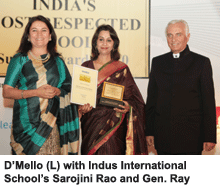 “Edexcel is the largest k-12 school-leaving examinations assessment and certification board in the UK with 8,500 schools in over 85 countries affiliated with us. Last year we assessed 5.5 million examination answer scripts worldwide. Recently Pearson Edcuation has taken a strategic decision to build capacity in order to make the entire gamut of Edexcel and PLS services available to institutions and students in India. It’s pertinent to note that Edexcel also offers vocational and higher education — including the Higher National Diploma — certification. Moreover our PLS division offers customised teacher training, content development, textbooks publishing and English language teaching services to governments and schools chains. All these services have now become available to our rapidly multiplying number of customers in India,” says D’Mello.
“Edexcel is the largest k-12 school-leaving examinations assessment and certification board in the UK with 8,500 schools in over 85 countries affiliated with us. Last year we assessed 5.5 million examination answer scripts worldwide. Recently Pearson Edcuation has taken a strategic decision to build capacity in order to make the entire gamut of Edexcel and PLS services available to institutions and students in India. It’s pertinent to note that Edexcel also offers vocational and higher education — including the Higher National Diploma — certification. Moreover our PLS division offers customised teacher training, content development, textbooks publishing and English language teaching services to governments and schools chains. All these services have now become available to our rapidly multiplying number of customers in India,” says D’Mello.
The extraordinary bandwidth of Pearson Education (India) also includes unusual — and much needed — clinical and talent assessment services. Against the backdrop that contemporary India ungraciously hosts an estimated 40 million challenged citizens with learning disabilities and psychological problems, it is fortuitous that the Pearson Group also boasts the world’s largest clinical assessment business vertical styled Pearson Assessment engaged in publishing assessment texts and test-kits for clinical psychologists, special educators, research institutions and universities engaged in psychometric testing.
“All clinical psychologists engaged in treating disabilities such as dyslexia, autism, adhd, memory loss, dementia, Alzheimer’s, depression, anxiety and other mental/psychological disorders need test-kits to diagnose the extent of the disorder. In this market segment, Pearson Assessment has the largest share worldwide and our kits are widely acknowledged as the gold standard,” says Sushil Eapen, the Bangalore-based managing director of Pearson Clinical and Talent Assessment (PCTA), a business vertical under Pearson Education India which since 2009 has begun direct (cf.distributed) operations in India.
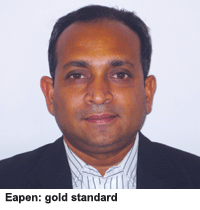 Clinical assessment services apart, PCTA also provides talent assessment services — English communication and personality assessment tests in parti-cular. “India’s BPO and call centre companies are the world’s largest users of English communication tests and we test over 100,000 job applicants for them through our user-friendly online tests. We also offer a 20-minute online writing skills assessment test designed by Stanford University. Both these businesses — much needed in India — are recording 100 percent growth per year,” adds Eapen an alumnus of the Kellogg School of Management and former Sara Lee, USA professional who assumed charge of PCTA in 2009.
Clinical assessment services apart, PCTA also provides talent assessment services — English communication and personality assessment tests in parti-cular. “India’s BPO and call centre companies are the world’s largest users of English communication tests and we test over 100,000 job applicants for them through our user-friendly online tests. We also offer a 20-minute online writing skills assessment test designed by Stanford University. Both these businesses — much needed in India — are recording 100 percent growth per year,” adds Eapen an alumnus of the Kellogg School of Management and former Sara Lee, USA professional who assumed charge of PCTA in 2009.
Inevitably the big-ticket entry of the contemporary world’s largest education company into the hitherto cocooned and autarkic Indian education system hasn’t enthused everybody. Especially not Left intellectuals who have dominated post-independence Indian academia. Despite it being painfully obvious that through their ideolo-gically-driven, slapdash acts of omission and commission the country’s Left-leaning academics have plunged public K-12 and higher education into a deep morass, they tend to be wary of the winds of liberalisation and change blowing through India’s moribund education sector, particularly of currents emanating from western democracies.
“Pearson is a profit-driven education multinational which at best will do business with private schools and institutions in India patronised by local elites. It won’t bother with government schools and higher education instit-utions which enroll 80 percent of students countrywide,” says a Delhi University sociology professor who requested anonymity, fearing the “long arm of multinationals in contemporary India”.
However perhaps anticipating such criticism, Khozem Merchant president of Pearson India is quick to rebut the elitism charge. “Over the past century during which the Pearson Group has been engaged with education in the UK, US and 60 other countries around the world, we have absorbed global best practices and outcomes in teaching-learning and support services. And it’s pertinent to note that in OECD countries, Pearson has acquired wide experience of working with government schools and public bodies such as municipal corporations, local authorities and quangos (quasi-NGOs). Therefore in India as well, we intend to engage with government and public sector education and make our knowledge and expertise available to government schools, colleges and universities. We pride ourselves not only for our knowledge and experience of education but also for our institutional ability to manage relationships with private school managements and government autho-rities, and I am confident we will constructively engage with private and government school bodies,” says Merchant who believes that the education opportunity in India is “big, immediate and transformational”.
The great majority of the country’s change-averse educationists and academics who seem to be blissfully unaware of the deep rot into which K-12 and tertiary education is inexorably sliding, is likely to view the London-based Pearson Group’s clear intent to deepen its engagement with Indian education with traditional suspicion. But right-thinking individuals of all ideological persuasions will undoubt-edly welcome the imminent big roll out of the world’s largest education corporation in India.
Having metamorphosed from a conventional textbooks publishing company into a multi-billion dollar new information techno-logies-driven conglomerate with proven expertise in content and curriculum development, teacher training, testing and assessment, certification and vocational and higher education, the transformation of Pearson India into a replica of its London-based parent corporation will offer new opportunities to K-12, vocational and higher education institutions floundering in a sea of troubles. It’s a lifeline that should be urgently grasped.